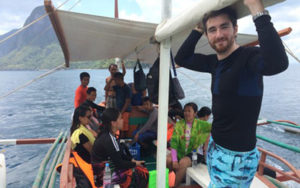
19 May 2016
Alan Kavanagh and I had the chance to talk about the Green Fins program and his role as Operations Coordinator. He explained what Green Fins does, some of the best practices they encourage, and his experiences working in the field.
What Is Green Fins?
Green Fins was initiated by the United Nations Environment Programme (UNEP). They have designated the Reef-World Foundation, a UK charity, as the international coordinators. They realized that the marine tourism industry had impacts on the reefs – mostly because there were no environmental standards or education programs for dive and snorkel operators. The collaboration between UNEP and Reef-World led to the creation of a comprehensive assessment and education program for the dive and snorkel industries.
Green Fins is currently working with dive centers and governments in Indonesia, Malaysia, the Maldives, the Philippines, Thailand, and Vietnam.
How Green Fins Works with Dive Centers
Alan has been working on Green Fins as the Operations Coordinator for Reef-World since 2014. The program had just 20 dive centers in 2008 compared to more than 400 today, and the network is growing every day.
Any dive center can join for free. As Alan explained, Green Fins provides active support to the dive and snorkeling centers that are in the 6 countries listed above. The assessment system is unique compared to other environmental standards because it helps the operators to reduce threats to the marine environment both above and below the water.
The Green Fins Toolbox
This year Reef-World launched the Green Fins Toolbox. It is a set of guidelines, handbooks, and tools to help implement and promote the Green Fins approach.
The Toolbox includes the Green Fins code of conduct and posters covering topics from plastics, to beach clean-ups, to batteries, to environmentally friendly recipes to clean boats and dive gear. The materials can be downloaded for free (and fast!) from the Green Fins website.
The Operational Handbooks are the most recent addition, targeting the three main audiences of the initiative: dive and snorkel center operators, marine site managers, and national level marine resource managers. They were created to provide guidance on the use of the materials, plus tips and tricks for implementation.
Active Green Fins members receive an annual training and a certificate of approval signed by the national government and the Coral Reef Unit of the United Nations Environment Programme. The Top 10 members – those with the best practices and least environmental impact – are highlighted on the Green Fins website. All active participating dive and snorkel centers are listed on the site.
A Few Questions for Alan
Kim: What makes the difference between a dive center that protects the reefs and one that destroys the reefs?
Alan: We have discovered that there are two major issues:
One is direct damage to the reef if guests are not guided correctly. So we assess how much time and effort the center spends with their guests before, during and after the dive. We watch what happens underwater with the dive guests. Do the dive guests have good buoyancy? Are they touching things, taking “souvenirs,” etc.?
The second is dive center management – or how people do their jobs.
Is the cook throwing food off the dive boat?
Are there ash trays and trash containers with lids on boats?
What cleaning products are used in the marine toilets (no bleach!) or to clean the outside of the boat?
Dropping anchor on live coral (yes, unfortunately it still happens.)
Where is waste oil disposed?
And many other basic questions…
Kim: What are you the most proud of?
Alan: I would say I am most proud of getting to where I am today. Marine biology students are always told they will struggle to get jobs but that is not true. The work is there if you are willing to create a role for yourself. Everyone I know in the industry is looking for people with good skills!
Kim: What is the one thing that would make your life easier?
Alan: Working in developing countries can come with a few struggles. Some of the places I work do not have network coverage for cell phones. Internet either does not exist or is slow. You have to plan ahead to meet deadlines like confirmation emails or sending project reports.
Kim: What keeps you motivated?
Alan: The positive conservation impact is what keeps me motivated. Some days are harder than others but knowing that what I am doing helps to multiply future conservation actions is what keeps me going. Plus, it is easy to motivate yourself when you can dive in world famous locations on the weekend.
Kim: What surprises you about your day-to-day life here?
Alan: The amazing amount of impact that only 6 people can achieve working from a hot office with a 1.5 Mbps internet connection. Every day we see new outputs and get new requests from each of the countries we work in.
